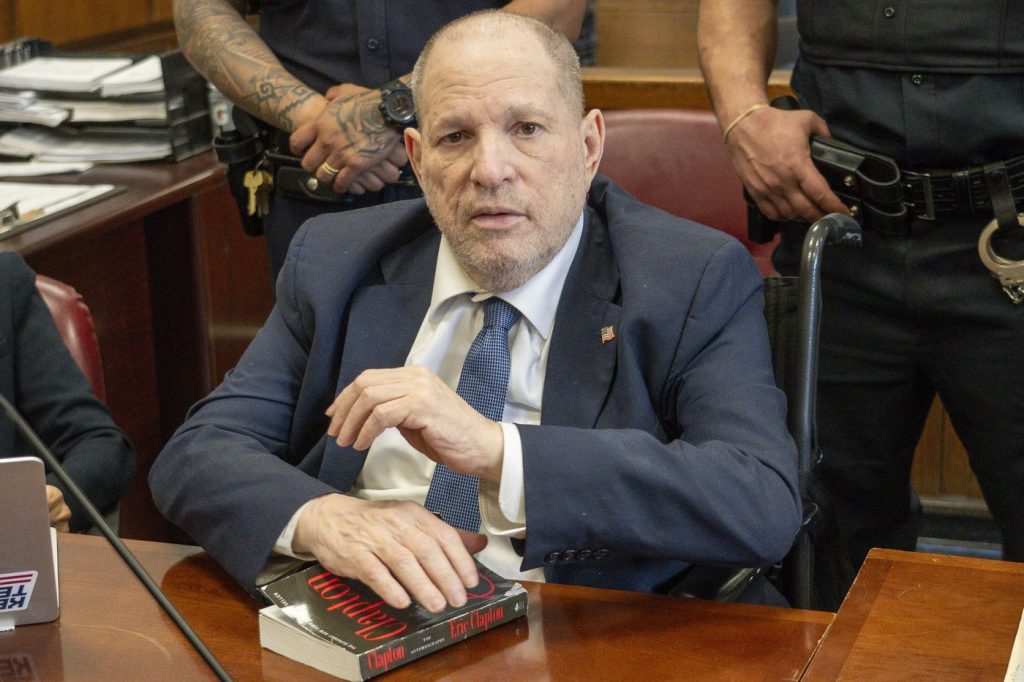Five years after Harvey Weinstein's original #MeToo trial, the former Hollywood mogul has entered a new trial following an appeals court's decision to overturn his high-profile rape conviction. The opening statements for the retrial are scheduled to begin on Wednesday and are expected to last approximately six weeks.
This trial is taking place at the same Manhattan courthouse as his first trial, with two accusers from the earlier case likely to testify again. However, the courtroom atmosphere is notably different this time around. Weinstein's retrial is occurring at a period when the #MeToo movement has both evolved and lost some momentum since it first surged in 2017 with allegations against him. Additionally, Weinstein faces an extra charge from a woman who was not part of the initial proceedings.
The jury for this retrial consists of seven women and five men, contrasting with the previous jury composition of seven men and five women that found him guilty in 2020. A different judge is presiding over the case, further illustrating the changes from the original trial. During Weinstein's first trial, the courtroom was filled with a charged atmosphere, including protests outside and extensive media coverage. This time, however, the jurors were selected with considerably less public attention and media buzz.
The New York Court of Appeals previously vacated Weinstein's 2020 conviction, which resulted in a 23-year prison sentence. The court's decision was based on the judge's allowance of testimony concerning allegations for which Weinstein had not been charged. These developments are impacting the legal strategies being employed during the retrial, as well as the overall atmosphere in the courtroom.
Weinstein, now 73 years old, is being retried on a charge of criminal sex act related to allegations that he forcibly performed oral sex on Miriam Haley, a production assistant, in 2006. He is also facing a charge of third-degree rape for allegedly assaulting aspiring actor Jessica Mann in a Manhattan hotel room in 2013. Additionally, there is another charge of criminal sex act involving a different unnamed woman, who came forward shortly before the original trial but was not included in that case. Prosecutors have revisited her allegations following the vacating of Weinstein's conviction.
Weinstein has pleaded not guilty and maintains that he has not raped or assaulted anyone. His acquittals on the two most serious charges from his 2020 trial, predatory sexual assault and first-degree rape, remain in effect. Lindsay Goldbrum, attorney for the unnamed accuser, noted that Weinstein's retrial represents a significant moment in the ongoing fight for accountability in sexual abuse cases, serving as a signal to other survivors that it is essential to speak out despite potential challenges.
This time around, the Manhattan district attorney's office is prosecuting Weinstein through its Special Victims Division, which specializes in handling such cases, compared to the homicide veterans who managed the 2020 prosecution. In contrast, Weinstein's defense team has expanded, including the addition of Jennifer Bonjean, who has experience in high-profile cases, such as helping overturn Bill Cosby's conviction.
Weinstein's lead attorney, Arthur Aidala, stated that the focus of this trial will be on the facts of the case rather than the broader implications of the #MeToo movement. Nonetheless, discussions surrounding #MeToo have already surfaced during jury selection, with prospective jurors expressing familiarity with the movement and its implications. Their varied opinions indicated differing perceptions of the movement’s impact, with some feeling insufficient progress has been made, while others expressed skepticism regarding false allegations.
Ultimately, none of the jurors who commented on #MeToo were selected. The retrial unfolds amid a shifting cultural landscape around sexual assault allegations and the #MeToo movement, presenting a complicated backdrop for both the prosecution and defense as they navigate the complexities of the case.











